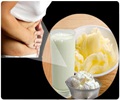A California company backed by Silicon Valley venture capitalists will soon start selling donated mothers' milk to hospitals treating premature infants, the Los Angeles Times reported.
The company, Prolacta, will offer regular and high-fat varieties for infants who need extra calories.The milk will be collected by donor nursing mothers at a network of hospitals around the US, be frozen and shipped to Prolacta's California headquarters for pasteurisation and distribution.
Currently, the company's equipment can process enough milk in a year to feed 100,000 hospitalised infants for two months.
As part of the agreement, hospitals would recruit and screen volunteer donors for diseases and collect and ship donated milk.
Prolacta, in turn, would provide hospitals with all necessary equipment - refrigerators, temperature-controlled shipping cartons and tracking software - plus payments linked to the volume of milk they provide.
Prolacta also plans to provide hospitals with a public relations programme to attract donors. Nursing mothers who agree to donate any amount of milk would receive a free motorized breast pump, a device for siphoning milk.
Advertisement
It only became commercially viable in June when Prolacta secured $4 million in venture funding from Draper Fisher Jurvetson, one of the leading venture capital firms in Silicon Valley.
Advertisement
Limited supplies of mothers' milk are currently available through nine non-profit milk banks scattered around the country, but most hospitals use manufactured formula to feed premature infants.
While mothers' milk is generally believed to be healthier for babies and their long-term development, a recent study has raised questions about whether pasteurisation purges milk of most of its beneficial substances.
In a study of 234 premature babies, New York doctor Richard Schanler found that infants on donor milk in the first few weeks of life fared no better than babies on formula. His four-year study results were published this month in the journal Paediatrics.
The first customer for the milk is the University of Rochester's Strong Medical Centre in New York.
The report said that non-profit milk banks were worried that the new company would siphon off donors. Others worried that the for-profit framework would eventually entice mothers to sell milk instead of nursing their own babies.
"I'm very concerned about mothers not giving their babies the benefit of their own milk," said Nancy Wight, an expert on the care of premature babies at Sharp Mary Birch Hospital for Women in San Diego, California.
Source:DPA











